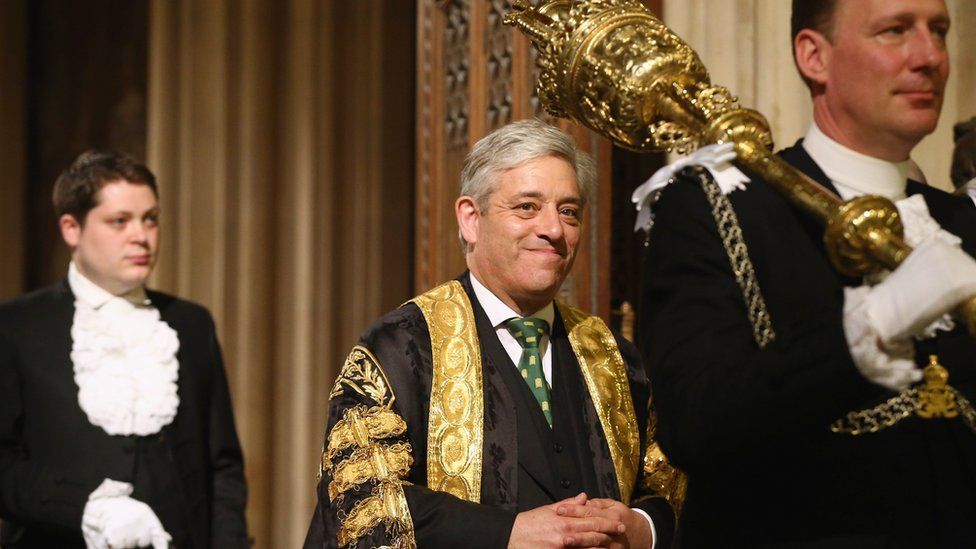Bercow's unprecedented ruling could change the course of Brexit
- Published

Boom! After a humdrum, almost completely unrevealing Prime Minister's Questions, the Commons erupted over Speaker John Bercow's decision to allow an attempt to change the rules for the resumed "meaningful vote" debate.
This is no mere technicality. The amendment proposed by former Attorney General Dominic Grieve would require the government to come back within three days, rather than 21, to debate the implications of not having a Brexit deal - if the prime minister's deal is indeed voted down next Tuesday.
Under the previous rules, that debate would be kicked back to late February, with the Brexit clock ticking remorselessly in the background.
The new Grieve amendment, now passed by MPs, means that in the event the PM loses next week, the Commons will then have a chance to vote on alternative policies - everything from a "managed no-deal" to a further referendum, via a "Norway option" or a reheated version of the current deal, could be on the table.
If a majority could be found for anything, it would not have the force of law - but it would at least indicate a policy which had the support of MPs.
This is, in short, a massive ruling by the Speaker, made, apparently, against the advice of the Commons Clerk, Sir David Natzler.
Sweeping precedent?
I don't want to delve too deeply into the arcana of Business of the House motions only amendable by ministers of the Crown, but this drove a coach and horses through accepted normal practice, and will have huge implications for the course of Brexit.
The decisions will come much faster, and potentially, those plotting an alternative course to the PM's would have more space in which to work.
And it may also set a sweeping precedent allowing MPs far more grip over their debates, on Brexit and pretty much anything else.
If such a precedent can be made to stick, it would be a huge blow against any government's accustomed control over the business of the Commons.
Bercow: "Anti-Brexit sticker belongs to my wife"
This is the biggest thing the Speaker has done, or is likely to do, easily eclipsing his decision to allow an extra amendment to the 2013 Queens' Speech, kicking off the Commons campaign which ultimately led to an EU Referendum becoming official Conservative policy.
He got through a testing hour of points of order - which represents a victory of sorts, because he wasn't toppled by angry MPs in the way Michael Martin was a decade ago. But there will be consequences.
For a start, a motion of no confidence in him now looks pretty certain. It may just languish in the "Remaining Orders and Notices" section of the Commons Order Paper, but it may take off and attract a critical mass of support from enraged Tories.
Beyond that, the Speaker already has Conservatives openly accusing him of pro-Labour bias. Once unthinkable, that has now become a daily event, and may now become an hourly event.
'Turbulent tenure'
Criticism of other aspects of his running of Commons business (too many urgent questions, emergency debates and over-running PMQs) may become continual.
Things are about to become very uncomfortable in the Chamber.
Above all there's the bullying inquiry and the allegations levelled against the Speaker himself, which have been repeatedly denied, that he has bullied colleagues.
This is an inquiry that should not be postponed to protect the Speaker, nor weaponised to destroy him; but it could well be.
I suspect that, one way or another, Mr Bercow's turbulent tenure in the Commons chair is coming to an end.
Perhaps in months rather than weeks, but not before the big Brexit votes (and it's not impossible that somewhere along the way, he might have to make this kind of ruling again).
The basic question his would-be successors will have to answer is how much of the Bercow revolution in the way the Commons works should be scrapped - and how much should be retained?
- Published30 July 2019